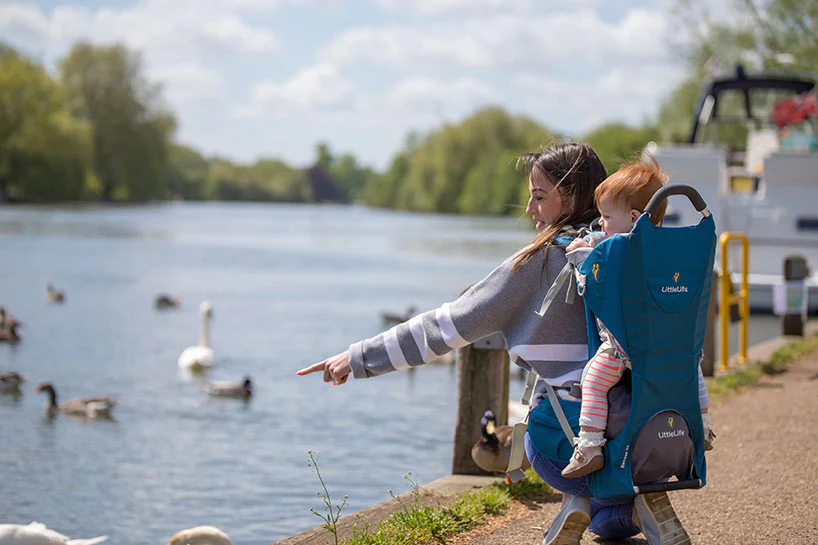Hiking with your baby is a wonderful way to enjoy nature and bond with your little one. However, to ensure a safe and enjoyable experience, it’s crucial to choose the right baby carrier designed specifically for hiking.
In this article, we’ll explore the benefits of hiking with a baby carrier, key features to look for, and some top recommendations to help you make an informed decision.
1. Benefits of Hiking with a Baby Carrier
Using a baby carrier for hiking offers numerous advantages for both parents and babies:
- Closeness and Bonding: Keeping your baby close while hiking promotes bonding and provides a sense of security and comfort for your baby.
- Hands-Free Convenience: A baby carrier allows you to keep your hands free, making it easier to navigate trails, manage hiking gear, and maintain balance.
- Mobility and Flexibility: Carriers offer greater mobility than strollers, allowing you to explore rugged terrains, narrow paths, and steep inclines that are inaccessible with a stroller.
- Fitness and Health: Hiking with your baby can be a great way to stay active and healthy. It’s an excellent form of exercise for both parents and babies, promoting overall well-being.
- Exposure to Nature: Introducing your baby to the outdoors early on fosters a love for nature and encourages healthy habits.
2. Key Features to Look for in a Hiking Baby Carrier
When selecting a baby carrier for hiking, consider these essential features to ensure comfort, safety, and functionality:
- Ergonomic Design: Choose a carrier that supports your baby’s hips and spine in an ergonomic position, promoting healthy development.
- Padded Shoulder Straps and Waistband: Look for carriers with well-padded shoulder straps and a wide, supportive waistband to distribute your baby’s weight evenly and reduce strain on your back and shoulders.
- Ventilation: Opt for carriers with breathable materials and ventilation panels to keep both you and your baby cool and comfortable during long hikes.
- Adjustability: Select a carrier with adjustable straps and settings to ensure a secure and customized fit for both parents and babies of different sizes.
- Storage Options: Consider carriers with built-in storage pockets for essentials like water bottles, snacks, diapers, and other hiking necessities.
- Sun and Rain Protection: Some hiking carriers come with detachable sunshades or rain covers to protect your baby from the elements.
- Safety Features: Ensure the carrier has secure buckles, straps, and a stable frame to keep your baby safe and secure during the hike.
3. Top Recommendations for Hiking Baby Carriers
Here are some highly recommended baby carriers designed specifically for hiking:
- Deuter Kid Comfort: This carrier offers excellent support and comfort for both parent and baby, with an adjustable harness system, padded straps, and ample ventilation. It also includes a sunshade and multiple storage compartments.
- Osprey Poco Plus: Known for its durability and comfort, the Osprey Poco Plus features an adjustable fit, a built-in sunshade, and a large storage area. It also has a ventilated back panel to keep you cool.
- Thule Sapling Elite: This carrier provides great support with its adjustable back panel and hipbelt. It includes a detachable backpack, sunshade, and multiple pockets for storage.
- Kelty Journey PerfectFIT Elite: With its PerfectFIT suspension system, this carrier adjusts easily to fit both parents. It offers padded straps, a ventilated back panel, and plenty of storage options.
- ClevrPlus Cross Country Baby Backpack: This affordable option includes a sunshade, rain cover, and multiple storage compartments. It provides good support with its padded straps and waist belt.
4. Tips for Hiking with a Baby Carrier
To ensure a safe and enjoyable hiking experience with your baby, keep these tips in mind:
- Start with Short Hikes: If you’re new to hiking with a baby, start with shorter, easier trails to get both you and your baby accustomed to the carrier and the activity.
- Check the Weather: Always check the weather forecast before heading out and dress your baby appropriately for the conditions. Bring sun protection, rain gear, and extra layers if needed.
- Stay Hydrated and Nourished: Carry enough water and snacks for both you and your baby. Make sure to take regular breaks to hydrate and feed your baby.
- Monitor Your Baby: Regularly check on your baby to ensure they are comfortable and secure. Adjust the carrier as needed to maintain proper positioning and support.
- Pack Essentials: Bring along essentials such as diapers, wipes, a change of clothes, a first aid kit, and any other items you might need during the hike.
- Stay on Marked Trails: Stick to marked trails and avoid overly challenging or dangerous paths, especially if you’re new to hiking with a baby.
Conclusion
Hiking with a baby carrier is a fantastic way to explore the great outdoors while keeping your little one close.
By choosing a carrier with ergonomic design, ample support, ventilation, and practical features, you can ensure a comfortable and safe hiking experience for both you and your baby.

